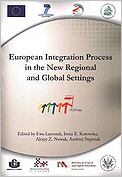EUROPEAN INTEGRATION PROCESS IN THE NEW REGIONAL AND GLOBAL SETTINGS
The book is the final result of the EUintegRATIO Project of the 7tri Framework
Programme coordinated by the Warsaw School of Economics. It was supported by the Ministry
of Science and Higher Education, the Faculty of Management, University of Warsaw, the
University of Gdansk and the National Contact Point for Research Programmes of the
European Union. The publication refers to selected issues debated during the international
conference ‘European integration process in the new regional and global settings‘,
held as one of the flagship conferences under the Polish Presidency in the EU in October
2011, Warsaw. The conference made a unique platform for discussions among researchers,
politicians and representatives of different institutions across Europe. Their expertise
and diverse views on the EU integration were invaluable to create this considerable
volume.
Preface
Part I. Towards Better Integration of Europe
- Taking Full Potential of Europe‘s Intellectual Capital
Leif Edvinsson, Universal Networking, Intellectual Capital Mkhal Boni, Levers of
Poland‘s Development Marie; Banach, The Key Role of Intellectual Capital in the Process
cf Modernization
Grazvna Henclewska, How to Enhance Growth in the Context of the Europe 2020 Strategy
Dominik Sobczak, European Union Framework Programmes for Research and Evolution of Funding
for Social Sciences and Humanities
Part II. Stability Problem of the Financial System after the Global Financial
Crisis
Marek Belka, The Eurozone Perspectives. The Prospects for Poland to Join the EMU
Laszlo Csaba, Perspectives for the Eurozone: Consolidation, Collapse or Muddling Through?
Finn 0strup, The Future of EU Policy Coordination: Dealing with the Financial Crisis
Alojzy Z. Nowak, End of Eurozone?
Dariusz K. Rosati, Public Finance Consolidation for Long-term Growth in the European Union
Ewa Latoszek, Trajectories of Consolidation of Public Finances in Poland during the Crisis
Axel Gerloff, Fiscal Stability in the Eurozone
Anna Visvizi, The Crisis in Greece & the EU Economic Governance: Lessons &
Observations
Stanislaw Kluza, New Regulatory Architecture towards Safety and Stable Growth
Part III. Regional Development in European Union Policy
Danuta Hiibner, Regions in the New Financial Perspective 2014-2020
Willem Molle, Competitiveness, EMU and Cohesion. Conditions for an Effective post Crisis
EU Policy
Dominique Foray, Smart Specialisation: from Academic Idea to Political Instrument, the
Surprising Destiny of a Concept and the Difficulties Involved in its Implementation
Andrzej Stejjniak, Aleksandra Borowicz, Pomorskie Province in the New Global Settings
Przemyslaw Dubel, Regional Policy in Reducing Regional Disparities
Anna Masloh-Oracz, EU 2020 from the Small and Medium Enterprises‘ Perspective
Anna Maria Nikodemska-Wolowik, Piotr Zientara, Family Enterprises in the European Union. A
Case for Regional Support
Maciej Krzemiriski, EU Structural Policy for 2014-2020. Opportunities and Challenges
Part IV. Social Reforms for the Sustainable and Inclusive Growth
Irena E. Kotowska, Population Change as a Main Driver of Pension Reforms in the EU
Marek Gora, Pension Reforms in the EU - Main Dilemmas and Prospects Edward Palmer,
Pensions in an Ageing Society. Time for NDC?
Robert M. Lindley, Extending Working Life: Employer Behaviour and Social Policy
Part V. The European Security, Energy Policy Aspects
Britta Thomsen, Renewable Energy and the Energy Efficiency Directive
Krzysztof Maryl, Political Coordination in Constructing the EU Internal Energy Market
Bartlomiej Nowak, Towards Energy Solidarity in the Treaty of Lisbon
Summary
422 strony, miękka oprawa


